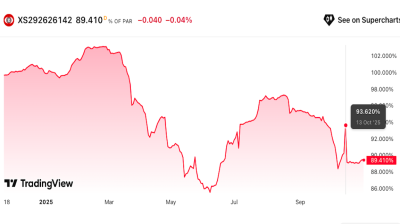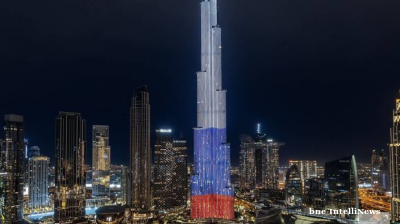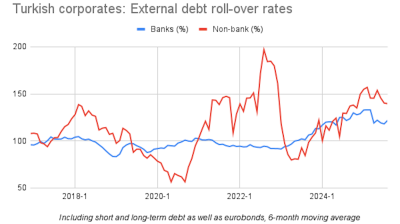No, Russia is not on the cusp of a banking credit crisis. That was the conclusion of a paper by Alexandra Prokopenko, a political economy analyst, writing for The Bell on January 17.
Last week, the Davis Center released a report suggesting that the Kremlin had forced banks to make some RUB25 trillion ($250bn) of soft loans to the defence sector companies and that had effectively trebled military spending to 18% of GDP.
The ominous projections of a financial crisis ready to engulf Russia circulating say Moscow is spending almost twice as much on the war as official figures suggest, pushing the banking system towards a collapse in which the authorities might end up freezing deposits.
Claims first appeared in a Substack post authored by Craig Kennedy, a Russia expert at Harvard, who spent many years with Morgan Stanley in Moscow.
Officials and analysts have dismissed concerns over frozen bank deposits or financial collapse as unfounded, asserting that the country's economic fundamentals remain intact. There is currently an unresolved debate with some arguing Russia is headed towards a wave of bankruptcies this year, while others say the economy is more robust than it seems. The Davis Center report is the addition to this debate and introduced a new element – massive state directed lending to the defence sector.
In his analysis, Kennedy alleged that Russia has developed a “low-profile, off-budget financing scheme” to sustain its war efforts in Ukraine. He linked a sharp rise in corporate borrowing – up more than 60% since 2022, reaching 19.4% of GDP – to military spending, claiming that as much as $249bn could be tied to defence-linked businesses.
Kennedy’s claims gained further attention when Financial Times economics editor Martin Sundby referenced them in an opinion piece, suggesting that an eventual credit crisis could lead Russian authorities to freeze private deposits to stabilise the financial system. Rumours of a looming deposit freeze in Russia have been circulating for several weeks already and has happened in the past on several occasions during earlier crises. Russians still recall the confiscation of funds during the 1991 monetary reforms, the partial freezing of accounts in 1998, and the forced conversion of foreign currency deposits in 2022.
Rumours intensified in November 2024, when economist Alexei Zubets suggested in a radio interview that freezing accounts could curb inflation, though his remarks were widely dismissed by officials, including the Central Bank.
“Right now, freezing deposits makes little sense. Lending is currently the basis of Russian economic growth, and, if accounts were frozen, then banks wouldn’t be able to extend further loans to businesses,” says Prokopenko, who used to work at the Central Bank of Russia (CBR). “The argument that a freeze is needed to curb inflation is also flawed: with high interest rates, a mass withdrawal of funds and increased spending seems illogical.”
“There are also doubts that a freeze could even stave off a credit crisis. Firstly, if such a crisis arises, it would make more sense for the authorities to guarantee all deposits. That would do more to protect the banking system and the economy. Secondly, Russia has fairly strict regulations designed to ensure financial stability, including large capital buffers,” Prokopenko added.
The CBR has refuted Kennedy’s analysis, stating that corporate borrowing since 2022 has risen by $300bn, far less than the $415bn his report suggested. Much of this increase stems from companies replacing foreign currency loans with ruble-denominated debt, reducing currency risk rather than as directed loans to the defence industry. Additionally, state-subsidised loans have largely been directed towards non-defence sectors such as real estate, construction, and trade, not the military industrial complex, the CBR said – a conclusion backed up by bne IntelliNews’ own analysis of bank sector lending. Loans linked to the defence sector remain a relatively small fraction of the total, says Prokopenko.
Concerns about hidden war spending are similarly overstated. While some costs, such as regional budget contributions to soldiers’ salaries or civilian hospital treatment for the wounded, may not appear in federal accounts, the claim that military spending is double official figures is unlikely. Prokopenko says that if defence spending consumed as much as 16% of GDP, as some have suggested, the strain on civilian production would be far more evident.
Russia’s financial system, bolstered by strict regulations and substantial capital buffers, appears resilient in the face of these speculative claims, Prokopenko concludes. Officials and experts continue to reiterate that the rumours of an impending banking crisis lack credibility, with many viewing the concerns as an overinterpretation of the country’s borrowing dynamics and war-related expenditures.
“In our view, all things being equal, it’s unlikely that the economy will implode soon, forcing Russia to scale back its military campaign in Ukraine; or that deposits will be frozen,” says Prokopenko, who otherwise has been hawkish on the state of the Russian economy. “That doesn’t mean, however, that nothing will ever happen to deposits, nor that the banking sector will always be trouble-free. However, there are far bigger threats to the Russian economy at the moment: for example, a lack of transparent decision-making, little independent expertise, and the classification of much economic data all undermines trust in the authorities. This is more likely to, eventually, lead to some sort of hard-to-predict, man-made crisis.”
Opinion

COMMENT: Czechia economy powering ahead, Hungary’s economy stalls
Early third-quarter GDP figures from Central Europe point to a growing divergence between the region’s two largest economies outside Poland, with Czechia accelerating its recovery while Hungary continues to struggle.

COMMENT: EU's LNG import ban won’t break Russia, but it will render the sector’s further growth fiendishly hard
The European Union’s nineteenth sanctions package against Russia marks a pivotal escalation in the bloc’s energy strategy, which will impose a comprehensive ban on Russian LNG imports beginning January 1, 2027.

Western Balkan countries become emerging players in Europe’s defence efforts
The Western Balkans could play an increasingly important role in strengthening Europe’s security architecture, says a new report from the Carnegie Europe think-tank.

COMMENT: Sanctions on Rosneft and Lukoil are symbolic and won’t stop its oil exports
The Trump administration’s sanctions on Russian oil giants Rosneft and Lukoil, announced on October 22, may appear decisive at first glance, but they are not going to make a material difference to Russia’s export of oil, says Sergey Vakulenko.




